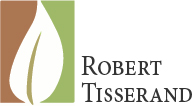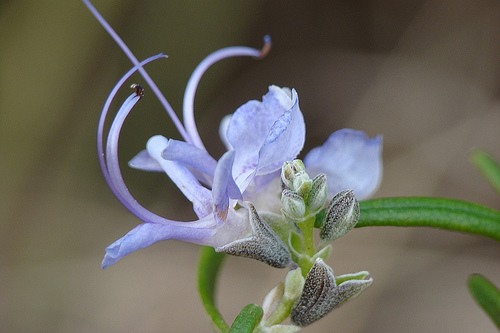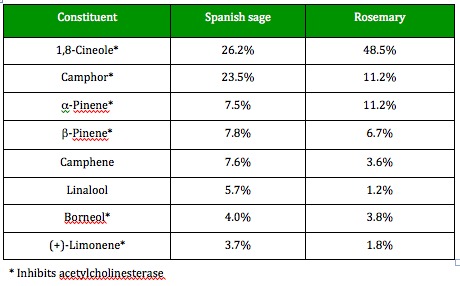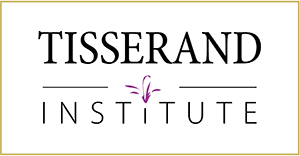 In 1652, English herbalist Nicholas Culpeper wrote, about rosemary: “Helps a weak memory and quickens the senses. The chymical [essential] oil drawn from the leaves and flowers, is a sovereign help…touch the temples and nostrils with two or three drops.” Scientists at Northumbria University (UK) are now uncovering how rosemary (Rosmarinus officinalis) oil does indeed sharpen mental faculties. Researchers Mark Moss and Lorraine Oliver detail how blood levels of 1,8-cineole, a rosemary oil component, correlate with improved cognitive performance (Moss & Oliver 2012).
In 1652, English herbalist Nicholas Culpeper wrote, about rosemary: “Helps a weak memory and quickens the senses. The chymical [essential] oil drawn from the leaves and flowers, is a sovereign help…touch the temples and nostrils with two or three drops.” Scientists at Northumbria University (UK) are now uncovering how rosemary (Rosmarinus officinalis) oil does indeed sharpen mental faculties. Researchers Mark Moss and Lorraine Oliver detail how blood levels of 1,8-cineole, a rosemary oil component, correlate with improved cognitive performance (Moss & Oliver 2012).
Moss and Oliver exposed 20 subjects to varying levels of rosemary oil vapor, and assessed speed and accuracy tests in mathematical tasks, and mood assessments. Intriguingly, the results indicate that the concentration of 1,8-cineole in the blood is related to an individual’s cognitive performance – with higher concentrations resulting in improved performance. The researchers stress that both speed and accuracy were improved, suggesting that the relationship is not describing a speed-accuracy trade-off. They carefully designed their study to eliminate any effect of expectation, or of the perceived aroma.
In an earlier study, Moss and colleagues compared the effects of inhaled rosemary oil, lavender oil and no odor, in a larger group – 144 subjects. In the rosemary group, recall accuracy was significantly improved, but not speed (Moss et al 2003). The main difference between this and the new research was the tasks subjects were asked to perform. This suggests that rosemary oil inhalation improves accuracy in any type of mental task, but that speed is also improved only in mathematical calculation.
The new research also noted an effect on mood, and a negative correlation was seen between changes in contentment levels and blood levels of 1,8-cineole. This, say the researchers, suggests that rosemary affects subjective state and cognitive performance through different neurochemical pathways. “Contentedness possessed a significant relationship with 1,8-cineole levels, and interestingly to some of the cognitive performance outcomes, leading to the intriguing proposal that positive mood can improve performance whereas aroused mood cannot” said Moss.
The blood-brain barrier
Christy C. Tangney is quoted on WebMD as saying: “More study is needed to see how, or even if, rosemary affects how quickly and accurately we perform mental exercises.” Tangney is an associate professor of clinical nutrition at Rush University Medical Center in Chicago. She feels that the findings could be due to chance or something else besides the fragrance. “There is something here. I don’t know that I could conclude that it is the aroma of the rosemary that is associated with improvements though” Tangney says.
On the face of it this is an odd comment, since the researchers were at pains to clarify that it is not the “aroma” of the rosemary oil that is producing the effect, it is the fact that constituents of the oil enter the bloodstream, and thereby produce an effect. But, Tangney probably meant simply that the rosemary oil might not be doing anything at all. I suppose someone has to be the designated bearer of the “it’s only placebo” message.
As small, fat-soluble organic molecules, terpenes like 1,8-cineole can enter the blood stream via the nasal or pulmonary mucosa. We know they can cross the blood-brain barrier (i.e. move out of the cerebral blood vessels and into the brain), as interactions with various receptor sites in the brain have been seen after administration (Aoshima and Hamamoto 1999, Elisabetsky et al 1999). In a German study, whether mice were given rosemary oil orally, or it was evaporated in their cage, similar blood levels of 1,8-cineole were detected. This was associated with an increase in ‘locomotor activity’ – spontaneous movement – thus demonstrating a stimulant effect from inhalation of the oil (Kovar et al 1987). This shows that inhalation of rosemary oil produces an effect on the nervous system that is not purely psychological, or due to expectation. We don’t know whether mice like rosemary oil, or whether it might improve their mathematical skills. I’m just saying…
Acetylcholine
1,8-Cineole is found in many other essential oils including eucalyptus, sage, laurel, myrtle and cardamon. Previous research has shown that it inhibits acetylcholinesterase (AChE) and butyrylcholinesterase (BChE) enzymes, which are important in brain and central nervous system neurochemistry. Acetylcholine is the principal neurotransmitter in the brain, so when the enzyme that breaks it down is inhibited, there’s more acetylcholine to help those synapses fire. The most commonly prescribed pharmaceuticals for treating loss of cognitive function in Alzheimer’s disease (AD) are AChE inhibitors, also known as cholinergic drugs.
A rosemary oil with 44.4% 1,8-cineole and 12.6% a-pinene inhibited AChE and BChE (Orhan et al 2008). All three of the major constituents of rosemary oil individually inhibit (AChE), as do three of its minor constituents. The AChE inhibiting effect is especially strong for 1,8-cineole and a-pinene, and less so for camphor. These three, and other constituents, act synergistically to produce the effect (Savelev et al 2003). There are several chemotypes of rosemary oil. The one used by Moss in all his research (from Tisserand Aromatherapy) is a 1,8-cineole chemotype. A typical analysis for this type of oil is shown in the Table below.
In a Japanese study, 17 AD patients were exposed to the vapors of rosemary and lemon oils in the morning, and lavender and orange oils in the afternoon for 28 days. Compared to similar pre-treatment and post-treatment periods, aromatherapy resulted in significant cognitive improvements (Jimbo et al 2009). In other clinical research, 11 AD patients were given small oral doses of Spanish sage (Salvia lavandulaefolia) oil, which is chemically very similar to the type of rosemary oil used by Mark Moss (see Table). Again, there were significant cognitive improvements (Perry et al 2003). When Spanish sage oil was taken orally by 24 healthy young volunteers in a placebo-controlled, double-blind crossover trial, both speed and accuracy significantly improved in tests of cognitive performance (Tildesley et al 2005).
Cholinergic function is surely not the whole story, and a number of other mechanisms are likely at work. For example, cognitive impairment in AD is also associated with low dopamine (Wolfe et al 1990), and 1,8-cineole increases dopamine release in brain cells (Kako et al 2008).
Summary
Taken together, the evidence for a positive effect on cognitive function by rosemary oil, and similar oils, is strong. Effects are due to synergistic interactions of constituents. Since both rosemary and Spanish sage oil have similar effects, the precise composition of the oil does not seem to be critical. Whether the perception of the rosemary odor produces contentment or relaxation may not be directly relevant, since taking the oil orally has a similar effect. This gives credence to Mark Moss’s contention that it is blood-borne essential oil constituents that affect mental function.
“Rosemary. For weyknesse of ye brayne. Agaynst weyknesse of the brayne and coldeness thereof, sethe rosmarin in wyne and lete the pacyent receve the smoke at his nose and kepe his heed warme.” The Grete Herball, 1529
References
Aoshima H, Hamamoto K 1999 Potentiation of GABAA receptors expressed in Xenopus oocytes by perfume and phytoncid. Bioscience Biotechnology & Biochemistry 63:743-748
Elisabetsky E, Coelho de Souza GP, Dos Santos MA et al 1995 Sedative properties of linalool. Fitoterapia 66:407-414
Jimbo D, Kimura Y, Taniguchi M et al 2009 Effect of aromatherapy on patients with Alzheimer’s disease. Psychogeriatrics 9:173-179
Kako H, Fukumoto S, Kobayashi Y et al 2008 Effect of direct exposure of green odour components on dopamine release from rat brain striatal slices and PC12 cells. Brain Research Bulletin 75:706-712
Kovar KA, Gropper B, Friess D et al 1987 Blood levels of 1,8-cineole and locomotor activity of mice after inhalation and oral administration of rosemary oil. Planta Medica 53:315-318
Moss M, Oliver L 2012 Plasma 1,8-cineole correlates with cognitive performance following exposure to rosemary essential oil aroma. Therapeutic Advances in Psychopharmacology doi: 10.1177/2045125312436573
Moss M, Cook J, Wesnes K et al 2003 Aromas of rosemary and lavender essential oils differentially affect cognition and mood in healthy adults. International Journal of Neuroscience 113:15-38
Orhan I, Aslan S, Kartal M et al 2008 Inhibitory effect of Turkish Rosmarinus officinalis L. on acetylcholinesterase and butyrylcholinesterase enzymes. Food Chemistry 108:663-668
Perry NS, Bollen C, Perry EK, Ballard C et al 2003 Salvia for dementia therapy: review of pharmacological activity and pilot tolerability clinical trial. Pharmacology, Biochemistry & Behavior 75:651-659
Savelev S, Okello E, Perry NS et al 2003 Synergistic and antagonistic interactions of anticholinesterase terpenoids in Salvia lavandulaefolia essential oil. Pharmacology, Biochemistry & Behavior 75:661-668
Tildesley NT, Kennedy DO, Perry EK et al 2005 Positive modulation of mood and cognitive performance following administration of acute doses of Salvia lavandulaefolia essential oil to healthy young volunteers. Physiology & Behavior 83:699-709
Wolfe N, Katz DI, Albert ML et al 1990 Neuropsychological profile linked to low dopamine: in Alzheimer’s disease, major depression, and Parkinson’s disease. Journal of Neurology, Neurosurgery, & Psychiatry 53:915-917






Rosemary Hydrosol is something I distil all year round for my own use. I am familar with the differences in the seasons and also at what state the plant is in. I use it daily to inhale to get it into my blood and brain, as a mouth spray, deodorant, skin tonic before I apply high vitamin creams and just because i love it! When it’s in flower its camphor notes are lower, just before it flowers its oils and sweet and in the winter is higher in camphor and is good for colds and stuffiness.
I was hoping to see this type of commentary following Moss’s and Oliver’s study. Various chemicals in essential oils help prove cognitive function in healthy individuals in three ways: by increasing the binding of acetylcholine to its receptors, by inhibiting acetylcholinesterase activity (as already noted), and by lowering acetylcholinesterase levels (by inhibiting phospholipase C gamma activity). Phospholipase C gamma (and beta) activity lead to the formation of amyloid plaques and peroxynitrites -the toxin held responsible for short-term memory loss in Alzheimer’s disease. Chemicals in various essential oils (including rosemary and sage) such as methoxyphenols (eugenol, thymol, and carvacrol) and if present rosmarinic acid and ursolic acid scavenge peroxynitrites (convert them into a less dangerous form). These compounds also reverse much of the damage that peroxynitrites do to transport systems, enzymes, tau proteins, and receptors involved in short-term memory (muscarinic acetylcholine), sleep (melatonin), mood (serotonin and opioid), social recognition (oxytocin), alertness (dopamine), and smell (olfactory). They also inhibit the influx of calcium thus limiting the death of neurons and the release of glutamate thus limiting the death of surrounding cells (see the following articles: Alkam, et al. “A natural scavenger of peroxynitrites, rosmarinic acid, protects against impairment of memory induced AB 25-35” and Irie, “Effects of eugenol on the Central Nervous System: Its possible application to treatment of Alzheimer’s disease, depression, and Parkinson’s disease.”
Alzheimer’s disease can likely be effectively treated with aromatherapy using various essential oils.
Thanks Robert once again for an excellent discourse and nicely documented research on rosemary. For two reasons I found this post particularly important. First of all, my family has a long history of Alzheimer’s, so obviously I’m selfishly interested in finding a cure and a way to prevent the possibility of it occurring in me or my family. Secondly, I did a research paper a few years ago for a product (simple blend of essential oils) that I used after working night shift at a hospital in Omaha and driving home to Lincoln the next morning (about an hour drive). The blend contains both rosemary and eucalyptus (globulus in this case) and I most definitely could tell a difference in my drive home while using this blend simply by putting a few drops on a kleenex. I’ve since that time considered that drivers in general, night shift workers, truck drivers, etc. could really benefit from using essential oils in this manner. I would also like to thank Mr. Simonian for his comments. I have to admit I “googled” your name and found so much good information on Alzheimer’s from just your comments on many of the Huffington Post articles. A wealth of information now at my fingertips – thank you.
Wonderful article, great discussions, Thank you Robert!
“There’s rosemary for remembrance.”
Interesting that it’s taken this long to come up scientific evidence for an attribute of rosemary that’s been recognized since well before the time of Shakespeare.
Thank you, Robert, as always. I immediately shared this one on FB.
Robert,
Thoroughly researched response as is your style. Thank you for your wisdom and generous sharing.
“…a negative correlation was seen between changes in contentment levels and blood levels of 1,8-cineole…”
This statement of NEGATIVE correlation says that higher levels of 1,8-cineole = lower levels of contentment.
The quote at the end of this same paragraph states: “…Contentedness possessed a significant relationship with 1,8-cineole levels…” The phrase “signficant relationship” used in its strict scientific meaning says there is a POSITIVE correlation.
So … which is it? Or am I missing something? Many thanks for the clarification….
DeeAnna,
It was a significant negative correlation. (Surely ‘significant’ can be negative or positive.)
My Daughter Lorraine Oliver is the co-author of this piece of research, and did her thesis on this subject while doing her research masters degree at Northumbria University.She has been unable to gain a position within her chosen career in psychology despite this excellent piece of work, what a waste.
Being content isn’t necessarily a good thing… you can be happy but not content meaning that you’ll be motivated to keep trying to improve your life.
Great article, Robert ~ thank-you for all your work. I stumbled upon it researching rosemary.